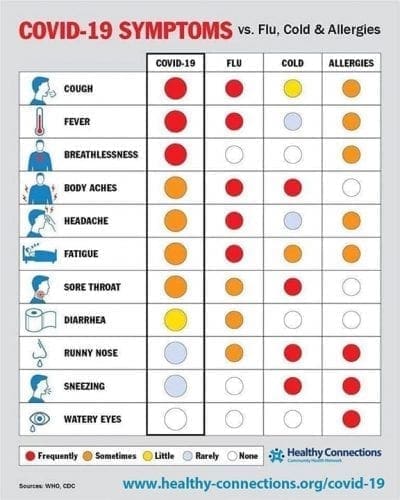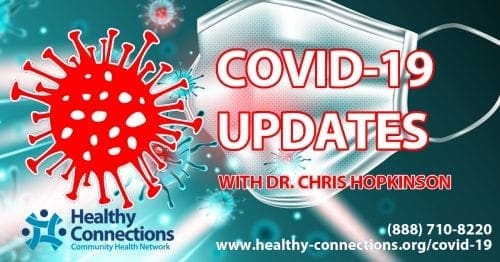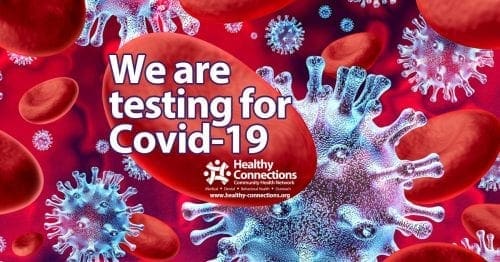Comparing COVID-19 to Colds and Flu
CLICK HERE TO VISIT HEALTHY CONNECTIONS’ COVID-19 (CORONAVIRUS) INFORMATION PAGE

CLICK HERE TO VISIT HEALTHY CONNECTIONS’ COVID-19 (CORONAVIRUS) INFORMATION PAGE
COVID-19 Update: What’s The Deal With Masks?
 BY DR. CHRIS HOPKINSON
BY DR. CHRIS HOPKINSON
HEALTHY CONNECTIONS LITTLE ROCK FRANKLIN COMMUNITY HEALTH CENTER
You likely have heard of the CDC’s recent guidance for everybody to wear a face mask when they must enter public spaces. If not, check it out here:
https://www.cdc.gov/coronavirus/2019-ncov/prevent-getting-sick/diy-cloth-face-coverings.html
The link also includes a handy guide to sewing your own mask.
It is important to understand the benefits of using a mask, but also the limitations of a mask in preventing transmission of COVID-19. We’ll explore these things here.
What kind of mask will work?
Cloth masks are perfectly sufficient for general use, as will be explored below. Access to medical masks, respirator type protective masks and other “official” or disposable masks will likely be hard to come by for the general public. They also offer limited (if any) additional benefit for reducing the risk of general community transmission.
What is important is that the mask covers your nose and mouth and that it fits comfortably without the need for constant readjustment and without falling off. And make sure it doesn’t impair your vision!
If you have access to needle and thread, you can make your own. Perhaps a family member could make some for you. Failing other solutions, a regular scarf or bandana that can be securely and comfortably wrapped about the nose and mouth can perform the same function.
What a mask will do:
To understand the benefits of using a mask, it is important to understand how the COVID causing virus is transmitted.
The primary ways that COVID-19 is transmitted are through direct contact with respiratory secretions (the stuff that sprays out of your nose and mouth if you cough or sneeze), or through contact with surfaces that have been contaminated by these secretions. Many surfaces may be implicated, but common ones include door handles, work surfaces, gas pumps, light switches etc. – any type of regularly touched surface. Clearly no-body is walking about licking these surfaces or rubbing their noses up against them! The way the virus is transmitted from these surfaces to your airways is via your hands (self-inoculation) after you touch them.
Enter the mask! Wearing a mask (such as described above) will:
- Do an excellent job of preventing droplets from your own respiratory secretions reaching other people or surfaces that others might touch.
- Help prevent self-inoculation through preventing you touching your face whilst you are out in public and surrounded by surfaces that could be contaminated.
- Provide some limited benefit in the event you take a direct hit from somebody else’s sneeze/cough – it is impossible to say how much benefit, lots of factors from the material used to the fit will determine this. Pragmatically however, it is pretty clear that something is better than nothing.
- Provide a visual cue to others – we are all in this together and the more we all strive to be safe, the greater our impact on reducing COVID transmission and infections.
What a mask will not do:
- Replace the need to wash your hands!
- You will only be protected from self-inoculation if the hands that eventually remove your mask are clean. Ideally, wash immediately before removing and again having handled the mask.
- Wash often and wash well, limit the surfaces you touch to the minimum necessary and make use of available resources (sanitizing cloths for grocery carts, hand gel on entering and exiting businesses etc.)
- Reduce the need to practice social distancing and relative isolation!
- Do your best to limit journeys and social contacts outside of your immediate household. Restrict these occasions to clear necessities – food, work, medical appointments etc.
- If you have to leave the house, in addition to masking up, make efforts to maintain 6 feet of personal space at all times
- Protect you from prolonged close contact with somebody that is sick with COVID-19!
- These masks are not likely to prevent transmission if you have prolonged close contact with the virus.
- Avoid close (within 6 feet) or prolonged (more than a couple of minutes) contact with confirmed or suspected cases.
- If you live with somebody who tests positive for COVID-19 the Arkansas Department of Health will offer you clear instructions for what to do next
- Allow you to get out the house with impunity if you are sick!
- If you have respiratory symptoms consistent with the COVID-19 virus please self-isolate!
- Call your doctor’s office for advice and, if necessary, for assessment.
- If you attend a clinic for medical assessment, please do wear a mask and anticipate being assessed in your vehicle or in a designated area away from the usual clinical areas.
How to look after a mask:
- Ideally, make or acquire more than one
- Wash between uses, certainly wash if it is becoming damp or appears soiled or if somebody sneezes on you
- Be sure not to reverse the mask – have an outer and inner surface.
- For cotton masks/scarves/coverings, a standard warm/hot washing machine cycle should effectively clean the mask
Learn more about COVID-19 (Coronavirus) at our information page at www.healthy-connections.org/covid-19.
COVID-19 Testing For All

Healthy Connections clinics in Arkansas ARE OPEN and now testing for COVID-19 for all patients who want to be tested.
Patients with symptoms such as fever, dry cough, shortness of breath have previously been tested. We have now dropped all conditions for testing. If patients want to be tested, we can test at our Healthy Connections clinics.
To be tested, please call (888) 710-8220 and make an in-clinic appointment. You will be directed to your nearest Healthy Connection clinic to receive your test. Note that all persons will be screened for fever, cough, shortness of breath, or contact with a person who has been tested for COVID-19. The COVID-19 test will be done at a designated location including tents outside the building, a special area of the clinic, or even the patient’s vehicle. This will be done to help ensure the safety of our other patients and our staff during the Coronavirus outbreak.
Patients can also use Healthy Connections TeleHealth appointments for all primary care/family medicine issues. This can include pre-screening for flu, strep, or COVID-19 symptoms. Visit www.healthy-connections.org/telehealth to learn more.
Also remember to practice social distancing when arriving at our clinics.
Healthy Connections clinics are located in Little Rock, Hot Springs, Mena, Malvern, Arkadelphia, Mount Ida, and De Queen. Find a location near you at www.healthy-connections.org/locations.
Learn more about COVID-19 at www.healthy-connections.org/covid-19.





